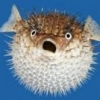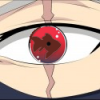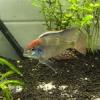I'm Unsure Where To Turn
#61

Posted 17 November 2015 - 02:56 PM
#62

Posted 17 November 2015 - 02:57 PM
your all looking far too deep for problems that simply dont exist..... tank was started on 29th september - today is november 17th - how do you expect the tank to have cycled in a little over 2 weeks... when cycling a tank from scratch your looking at 6-8 weeks to complete a good cycle with any depth... depth? i hear you say? as in sufficient numbers of bacteria to support a good number of fish....
you wanna start a new tank - get your self 2 goldfish around 10cm (cheapies) and put em in your tank and feed them 2-3 times a day..... check ammonia daily - when the level reaches 2ppm or greater do a 50% water change.... after a few weeks of this hopefully your ammonia levels should start to reduce on their own without you water changing... when this happens you can test for nitrates now to see if your cycle is starting to establish.... when you consistantly get 0 ammonia and 0 nitrites and a good reading of nitrates you have completed a cycle.... if nitrates are over 40ppm then you can do 50% water change to reduce them... keep nitrates under 80ppm and best if they are under 40ppm - and the way to do this is simple -> water changes....
dont clean your filter during the cycle - only a mild clean if flow stops and do it inside the tank as you dont want to lose any bacteria that is growing....
once you have established beneficial bacteria in your filter and everything is working as it should you can slowly add more fish at the rate of 1-2 per week....
at this point water change once a week and test your nitrates -> ideally to keep nitrates low you may need to increase the size of your water or increase the frequency of changes....
lastly look after your bacteria and your fish will have a much better chance of living....
p.s. your just making all the noob mistakes that everybody does when first starting an aquarium for the first time...
I completely agree for my mistakes, although it has been ~ 9 weeks now since i started fresh, and i initially left the tank cycling with guppies and tetras for at least a month and had the highest ppm at ~20. It is hard to understand where the cycle was at due to being heavily planted and aqua soil as they break down nitrates and nitrites.
My current fish that are in the tank are i guess a lot more hardy but are more than happy with no problems.
Lastly, i added the discus ~ 1week ago, so assuming you are correct in a full cycle taking 6-weeks i would suggest with low readings of ammonia and reasonable readings of nitrates prior water changes that the bacteria had at least been somewhat established with the enlisted help of fresh-start bacteria chemicals added at first.
I do believe the reason for them becoming ill is due to the bacteria not being as 'strong' as what i would like it to be, but looking how its only effected my previous cichlids and my current ones, makes me believe it is a parasite.
This discus are currently in hands of professionals, who strongly believe it is gill flukes and being treated. The wild type is however looking still healthy and hopefully *fingers crossed* can stay well. In the meantime, the good bacteria should be building up in my tank until the problem is resolved.
I hope you can see where i am coming from, and thanks for your suggestions as i do believe you are correct.
-Thanks
#63

Posted 17 November 2015 - 11:34 PM
beneficial bacteria numbers will only increase when there is a source of ammonia -> the fish are your source of ammonia... when your bacteria have reached sufficient numbers to cope with your current fish their numbers dont multiply again till your ammonia source (fish) increases... this can be done by increasing their food or by adding more fish... each time you increase your ammonia load you will experience a mini cycle - often not even detectable....
something else for you to learn beneficial bacteria numbers can double every 15 hours in ideal conditions.... so they will grow exponentially.... eg:
1 bacteria -> 2 bacteria -> 4 bacteria -> 8 bacteria -> 16 bacteria -> 32 bacteria -> 64 bacteria -> 128 bacteria -> 256 bacteria -> 512 bacteria -> 1024 bacteria -> 2048 bacteria -> 4096 bacteria -> 8192 bacteria......
this is why achieving a cycle takes so long -> but towards the end of your cycle its booming.... and thats why you can add 1-2 fish per week once you have a good deep cycle completed....
also when you clean your filter - if you clean it in tap water you kill off all your bacteria and will need to start again....
when cleaning your filter be gentle to remove muck thats blocking the flow but not to remove too much bacteria.... if you remove too much bacteria you are sending your tanks cycle backwards and you will again experience ammonia spike....
and just curious who these professionals are that have your discuss ? maybe they arent as fish savvy as they have made you believe....
gill flukes are a parasite just for the record... and can be very contagious.... and depending on the fish can be fatal in a short period of time.... but mostly gill flukes takes a longer period of time to cause fatalities....
now if you decide to treat for gill flukes -> most likely will set your tanks cycle backwards again as a lot of chemical medications kill off bacteria...
so you see everything is related to your bacteria -> and that has been your problem....
i breed/sell fish for a living and do this stuff 8-12 hours a day 7 days a week for over 10 years and have learnt from the best...
your problem is pretty clear to me....
#64

Posted 18 November 2015 - 01:30 AM
beneficial bacteria numbers will only increase when there is a source of ammonia -> the fish are your source of ammonia... when your bacteria have reached sufficient numbers to cope with your current fish their numbers dont multiply again till your ammonia source (fish) increases... this can be done by increasing their food or by adding more fish... each time you increase your ammonia load you will experience a mini cycle - often not even detectable....
something else for you to learn beneficial bacteria numbers can double every 15 hours in ideal conditions.... so they will grow exponentially.... eg:
1 bacteria -> 2 bacteria -> 4 bacteria -> 8 bacteria -> 16 bacteria -> 32 bacteria -> 64 bacteria -> 128 bacteria -> 256 bacteria -> 512 bacteria -> 1024 bacteria -> 2048 bacteria -> 4096 bacteria -> 8192 bacteria......
this is why achieving a cycle takes so long -> but towards the end of your cycle its booming.... and thats why you can add 1-2 fish per week once you have a good deep cycle completed....
also when you clean your filter - if you clean it in tap water you kill off all your bacteria and will need to start again....
when cleaning your filter be gentle to remove muck thats blocking the flow but not to remove too much bacteria.... if you remove too much bacteria you are sending your tanks cycle backwards and you will again experience ammonia spike....
and just curious who these professionals are that have your discuss ? maybe they arent as fish savvy as they have made you believe....
gill flukes are a parasite just for the record... and can be very contagious.... and depending on the fish can be fatal in a short period of time.... but mostly gill flukes takes a longer period of time to cause fatalities....
now if you decide to treat for gill flukes -> most likely will set your tanks cycle backwards again as a lot of chemical medications kill off bacteria...
so you see everything is related to your bacteria -> and that has been your problem....
i breed/sell fish for a living and do this stuff 8-12 hours a day 7 days a week for over 10 years and have learnt from the best...
your problem is pretty clear to me....
The guy who is inspecting the fish has breed discus for ~10 years. Where the person who is taking care of them has owned discus for numerous years, and breads other fish.
The discus are now in an established tank which has been running for 6 weeks with guppies and no alternations, essentially a quarantine tank.
I do believe it is the bacteria not being built up as like you say, however why would every other fish be 100% healthy while the discus show signs of distress, sickness breathing heavily and reluctant to eat.
also inspecting the discus after it died, its face had turned white, and gills were extremely swollen.
i understand what you are saying and for the meantime while they are not in the tank i am going to let the bacteria get extremely well established before re-introducing the discus, if they survive after treatment.
#65

Posted 18 November 2015 - 05:36 AM
Under any circumstances where an aquariums health is compramised I would expect discus to be the first affected... they are not as tough as their tank mates.
Edited by malawiman85, 18 November 2015 - 07:41 AM.
#66

Posted 18 November 2015 - 03:13 PM
Totally agree with Johnno on Flukes. Not likely to knock over fish so quickly. Would you have not been advised and subsequently treated your tank with kusuri +? That stuff will do the business very efficiently on gill flukes.
Under any circumstances where an aquariums health is compramised I would expect discus to be the first affected... they are not as tough as their tank mates.
Yeah i have treated with Kusuri + but saw no improvements.
Currently treating with gill fluke focused medication.
#67

Posted 01 December 2015 - 06:55 AM
Short medium looking red worms are exactly what blackworms look like.
They happily live in substrate feeding on mulm.
I have them living on the botom of my k media filter tubs.
Doesn't take much to establish,,,,, many many years ago I use to feed thm to Ray pups,,,,, and now they exist anywhere they can.
I've known many people with blackworms in their filters and substrate.
Blood worm larvae are small and earthworms won't survive under water.
Yes mate there is some aquatic species of " earthworms" google it, search old posts on white worms on this site [ Terry had some photos up] or call in some time and i will siphon some out and show you.
#68

Posted 01 December 2015 - 08:29 PM
Update:
After the death of my blue diamond, i put my wild and red turq into a friends hospital tank for ~ three weeks. This tank had been established with guppies for around 3-4 months, once again this guy is an experienced breeder and a great understanding of fish. The water quality was perfect on both sera and API testing kits. As the tank i believe only had some drift wood and no substrate i imagine the KH would of been average around 4-6, Ammonia 0.
After 7 days the sick looking red turq died, the same signs and symptoms as the others. Swollen gills, damaged fins (not extreme but present) and a complete discolouration around the head area ~ obviously removed from the tank. *please note the fish did not seem stressed after arrival*
another 10 days passed and the wild seemed almost perfect, actively eating happily swimming and exploring, exactly what a normal 'healthy' fish would do.
today on the 1/12. My wild died at some point during the day being perfectly fine in the morning, the same signs and symptoms, however he didn't seem to deteriorate like the others over a period of time.
I would also like to add my other community tank (which has been running for 4 months) with a variety or kribensis, pictus, guppies, mollys, angels also lost two baby discus today with exactly the same signs+symptoms except more fin damage.
Overall from what i gather, majority of people have been reading this and expecting like i am novice at fish keeping ~ i breed a variety of fish and in all seriousness i have never encountered a problem with fish except for this cichlid family.
And i have read a lot of forums with people posting similar if not exact same problems, with no answers or leaving it unanswered ~ or assumed it was ammonia poisoning.
I don't expect anyone to have an exact answer for me and majority of people are more focused on the flaws of what i have done. I have skipped some steps in maintaining this aquarium just like the average folk, except i am just being honest in my approach to hopefully finally work out what is wrong and how i fixed it for some other poor soul who just wants to experience the same hobby i enjoy too.
The people i have spoken to basically do not know, you can put it down to not having an established aquarium and effectively killing my fish, or you could help me try understand what has happened.
All i am asking for is suggestions, wrong or right, i'm not an arrogant person and i won't turn your suggestion away because this could be something so simple that i didn't even notice.
I have and still will take everyones suggestions into consideration. I just want to 'move on' from jump to statistics about how all fish die from ammonia, as i do not believe that is the case for this tank.
If someone wants to run through my exact procedure one on one and try work out what i should change/suggest anything i am more than happy to right a step by step precess on what i have done over the last 6 months.
TLDR:
-I understand an aquariums bacterial cycle to an extent, and don't believe that this is as simple as ammonia/under established filter.
-Looking for more suggestions.
Things i want to focus more on:
Soil and the understanding of how it directly impacts the ammonia/nitrate cycle ~ this is still relatively new to me, however my other 4 tanks now have soil (amazonia APA) and are fine.
The tank i have when all my problems began, is it possible that something could directly effect the cichlid/cory family as those are the only species which have died in this tank.
Ps.
For those who have been reading and following this experience thus far. Even if you believe i am wrong in my processes of what i have stated, and suggested changes i have taken them into consideration and Thank you for your help.
#69

Posted 02 December 2015 - 07:18 AM
If they start dying again, then it becomes much easier to narrow down the source.
If they don't, then start adding other stuff but I wouldn't reuse your cannister, filter media, tubing or substrate from your other set-up unless bleached.
Sent from my E6653 using Tapatalk
#70

Posted 02 December 2015 - 07:53 AM
Edited by chocky, 02 December 2015 - 07:54 AM.
#71

Posted 02 December 2015 - 10:04 PM
As some issues are secondary then finding the primary issues can be very difficult as its past that point.
If the tank is wiped,,, as already mentioned,,, leave it running,,, bleach it (non-perfumed), leave a few days then empty and strip everything completely back and dry out.
Assemble all back together and cycle for 4 weeks with 3 x tablespoons of fish food (to trigger beneficial bacteria).
Contact living1978 on this forum and buy some quality discus from him,, also he has Kusuri,,, and if used often as per instructions you'll have much success.
#72

Posted 03 December 2015 - 07:19 AM
today on the 1/12. My wild died at some point during the day
was this in your friends hospital tank or back in your problem tank?
#73

Posted 03 December 2015 - 02:42 PM
Things i want to focus more on:
Soil and the understanding of how it directly impacts the ammonia/nitrate cycle ~ this is still relatively new to me, however my other 4 tanks now have soil (amazonia APA) and are fine.
The tank i have when all my problems began, is it possible that something could directly effect the cichlid/cory family as those are the only species which have died in this tank.
The original post has coral sand as the substrate, I am assuming no soil was involved, so I doubt soil is the issue.
As for the impact of soil on the ammonia/nitrate cycle, like most things it depends (type of soil, how much organic matter, depth, contaminants, etc)
I have been using soil in aquariums for 20 years without problems.
The biochemistry and biology of submersed soils is extremely complex, but it is not really necessary to understand it.
You have to take care with freshly submerged soils as they will release ammonia into the water (the more organic matter the more ammonia they tend to release), but his usually stops after a week or two.
If anything soil improves the biological filtration, by providing a whole lot of surface area and a whole raft of different bacteria that operate at different degrees of oxygen saturation.
Cheers
Brett
0 user(s) are reading this topic
0 members, 0 guests, 0 anonymous users











